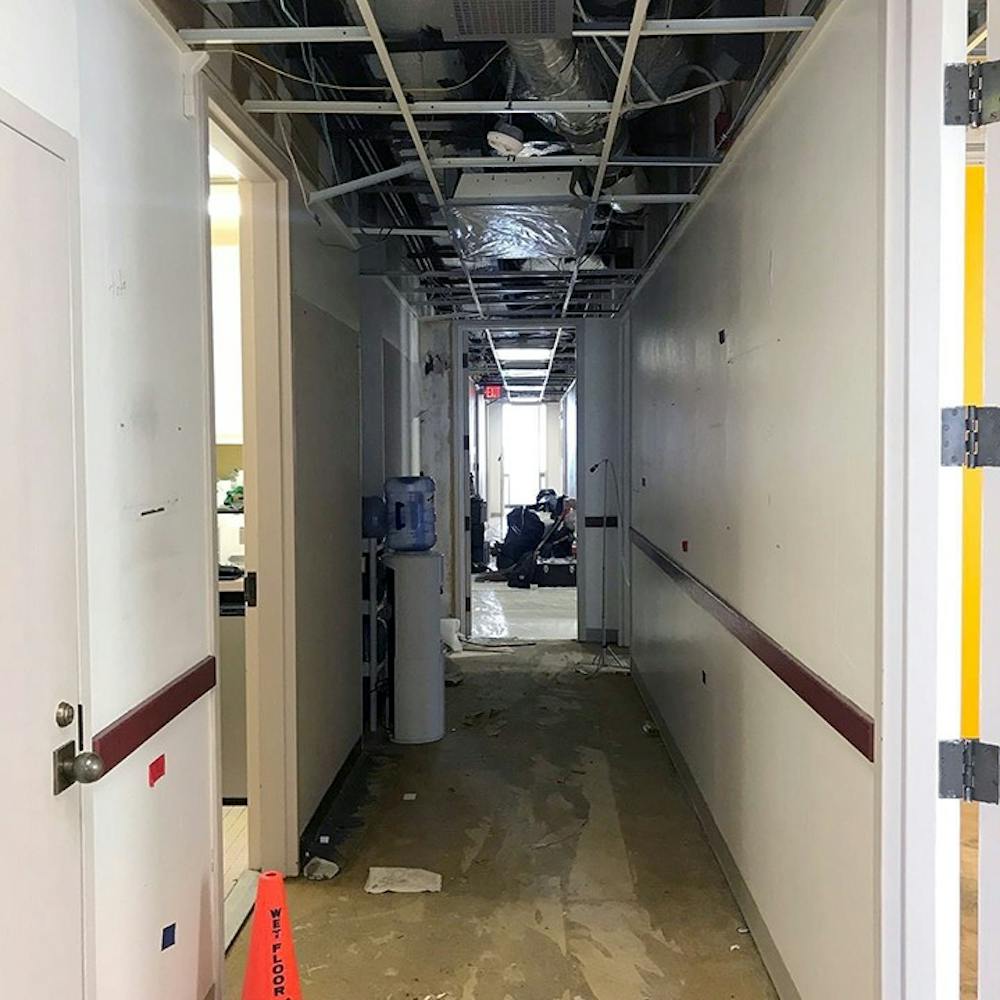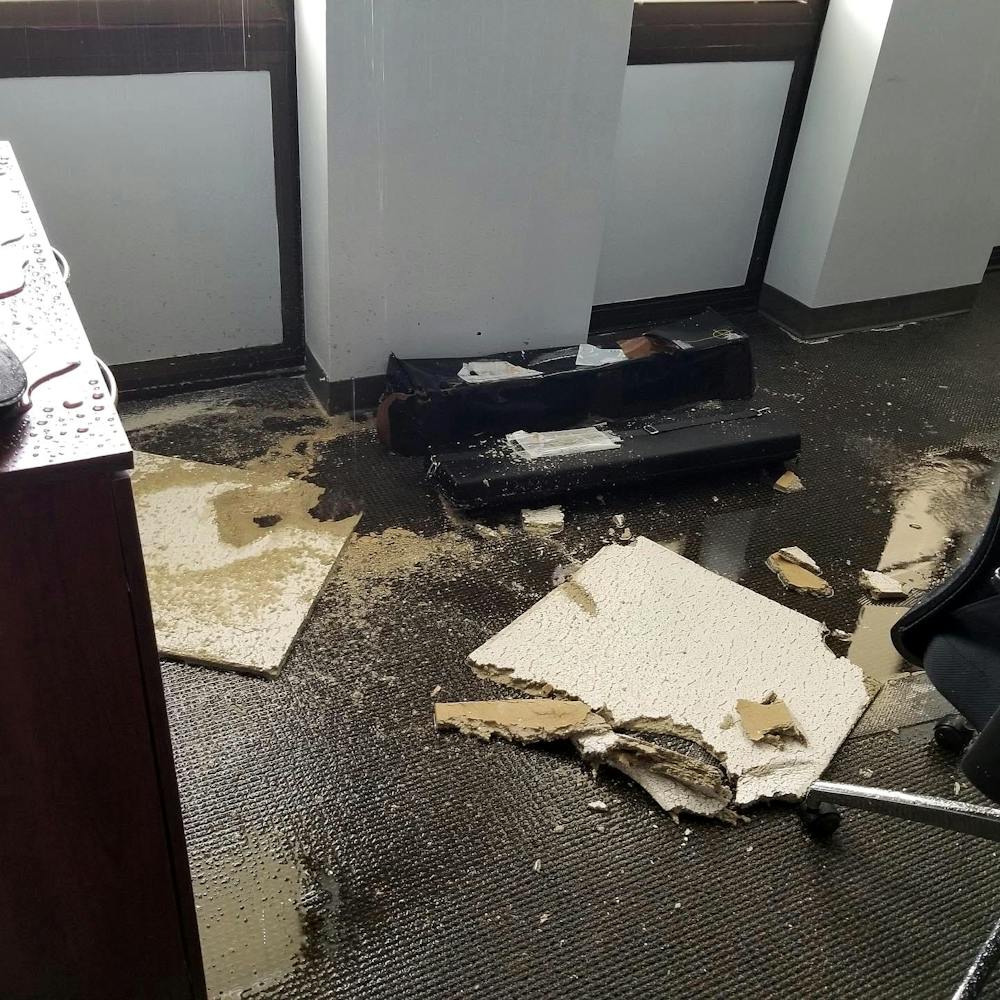Federica Schoeman, an associate professor of English and Jewish studies, discovered a puddle of water in her office on the fifth floor of the J. Welsh Humanities Office Building.
That puddle was a part of a larger flooding problem that would affect the entire building and end up displacing professors. The Humanities Office Building is still undergoing repairs and other renovations, and the building might remain closed until April 2021.
“We’ve been almost shell-shocked for, particularly, the first few months and weeks because it all happened very quickly,” Schoeman said.
After investigating, officials found one of the water pipes in the building had burst and caused flooding in the top floors.
Derek Gruner, university architect and associate vice president of facilities planning, design and construction, said a water pipe burst around June 6 in a mechanical penthouse, which is a mechanical room located at the top of the building. The flooding made it down to the first floor and caused damages to ceilings, walls and floors.
Anne Gulick, an associate professor in the English department, said faculty members had been told they would be able to return to the building in August, but that has yet to happen. In the meantime, faculty members have been assigned temporary offices in the Carolina Coliseum, but they still have not received their office keys and assignments.
The Department of Languages, Literatures, and Cultures plans to start giving out the temporary office keys for languages on Monday, Meaghan Haxton, the department's coordinator and director of communications, said.
Faculty members were given one hour to retrieve essential belongings from their offices before the building was closed. Their remaining belongings have been put into storage, and they have almost no access to their things, Schoeman said.
Gulick said she hopes everyone is able to retrieve their belongings when faculty members receive access to their temporary offices.
“We also really won't know until we get in there what has happened to our things, what kind of damage has been inflicted on them,” Gulick said.
Gruner said the majority of the fixes to the water damages have been completed and these repairs were covered under the university’s insurance policy.

Since the building is around 50 years old and many faculty members are already off-campus due to the pandemic, Gruner said the university is taking the opportunity to replace some of the VAB units, which are smaller air-conditioning units, on the upper five or six floors of the building.
“We’re taking this opportunity now to replace them because it will be the least impactful to the faculty,” Gruner said.
According to Gruner, the board of trustees has already approved a project for mechanical renovations in February, so they already had the funding for these additional renovations. These non-flooding-related mechanical renovations are estimated to cost $975,000.
Gruner said this work will start at the end of 2020 and possibly go until April 2021.
“The goal here would be that by the end of the spring semester, most of the floors, more than half, should have new air conditioning equipment, and the faculty can move back in over the summer or maybe it’ll just be ready for them when they come back in the fall,” Gruner said.
The displacement from the humanities building has also affected faculty members' teaching. In addition to many of them already working from home due to the COVID-19 pandemic, faculty members don’t have access to the building’s resources or to many of their notes and books.
Gulick said she’s going through ink cartridges for her at-home printer very quickly, and she also does not have access to a high-quality scanner, a copier or many of her books and files.
“All the materials that I would really capaciously work through in trying to prepare for our course, none of those materials were available to me, and that was definitely stressful,” Gulick said.
Schoeman said she is worried she will be assigned to teach a different course in the spring because she only has her books and notes for the course that she is currently teaching. However, she said she was glad the displacement happened when faculty members were already avoiding campus because of the pandemic.
“If it had to happen, it’s just as well that it happened on this COVID year because we were avoiding our offices for fears of contagion in the elevators, bathrooms. We couldn't meet students there in-person for the same reason,” Schoeman said.
Haxton said she was grateful for the perseverance displayed by faculty members that have continued to teach in the midst of the COVID-19 pandemic and displacement from their offices.
“They're already dealing with trying to figure out how to teach during a pandemic. They had already had to shift online at the drop of a hat, and then for this to happen on top of it was just an additional stressor we couldn't have imagined,” Haxton said.
Gulick said she appreciates administrators' efforts throughout the whole process.
“I generally believe that there's a good-faith effort, at this point, to take care of the faculty and to recognize how serious this problem is,” Gulick said.
Holly Poag contributed to the reporting of this article.

